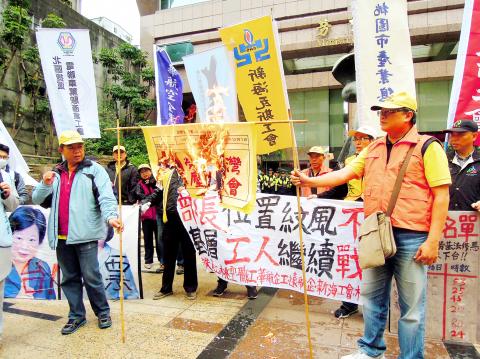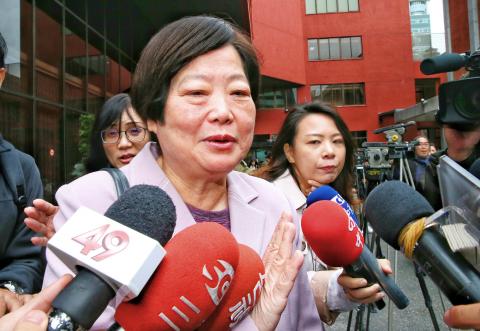Democratic Progressive Party (DPP) legislative caucus whip Ker Chien-ming (柯建銘) yesterday said that the Cabinet’s proposed amendment to the Labor Standards Act (勞動基本法) would undergo “subtle adjustments” next week.
Ker made the announcement following a meeting of the DPP caucus during which Minister of Labor Lin Mei-chu (林美珠) briefed DPP lawmakers on the adjustments.
The adjustments were proposed after Premier William Lai (賴清德) met with DPP lawmakers twice this week to hear their opinions and considered the public’s attitude toward the amendment, he said, adding that the adjustments will focus on several “regulatory measures” and would “tighten the rules” in the draft amendment.

Photo: CNA
Draft regulations that would allow employers to legally make employees work up to 12 days in a row before granting them two days off and that would reduce the minimum rest time between shifts from 11 to 8 hours will not be implemented at employers’ discretion, but after only local authorities meet with sector associations and determine which sectors have “special needs” that warrant such work schedules, Ker said.
Local authorities are to publish a list specifying sectors that qualify, which will then be double-checked by the labor ministry, Ker said.
That means requests to implement more flexible labor rules will not be reviewed on a case-by-case basis, but by sector, he said, adding that granting workers one day off every seven days and at least 11 hours of rest between shifts would remain the norm.

Photo: Chang Chia-ming, Taipei Times
Local governments are to announce which sectors are eligible for flexible schedules and individual employers in those sectors will then be allowed to start negotiations with unions or employeeswhose consent they first need to obtain, Ker said.
Employers are to specify under what circumstances and for how long they plan to implement flexible schedules, which are to be regularly reviewed by authorities and will be subject to change, he said.
Special circumstances under which the schedules could apply would include peak seasons, performance tours, large events and companies that are under pressure to fulfill orders within a limited time frame, Ker quoted Lin as saying.
One of the regulatory measures stipulates that, should any employers arbitrarily implement flexible schedules, employees could file complaints with local authorities, Ker said.
Asked if the caucus would clear the draft amendment through committee reviews next week, Ker said: “That is our hope.”
Separately yesterday, Lai said that the underlying principles of the draft amendment would remain unchanged, but called for the legal language to be drafted more precisely so that the public may understand the amendment better.
The draft amendment has gone through sufficient discussion and gained universal support among DPP members, he said, adding that it would grant employers and employees alike more flexibility, provided that labor rights are protected.
The premier on Thursday night on a political talk show rejected criticism that the amendment would “set labor rights back 100 years,” saying that the majority of workers will still have 12 hours of rest each day.
Total daily working hours will be capped at 12, he said, adding that it is “impossible” for a person to work for 16 hours and only rest for eight hours a day.
“In the worst-case scenario, workers will have at least 12 hours of rest,” Lai said, while conceding that some professions, such as nursing, might require special rules.
The biggest problem with the current “one fixed day off, one flexible rest day” policy is that it lacks flexibility, forcing 19 percent of workers to forgo opportunities to earn overtime pay and exposing them to increased competition from part-time workers and automated production lines, Lai said.

Chinese Nationalist Party (KMT) Chairman Eric Chu (朱立倫), spokeswoman Yang Chih-yu (楊智伃) and Legislator Hsieh Lung-chieh (謝龍介) would be summoned by police for questioning for leading an illegal assembly on Thursday evening last week, Minister of the Interior Liu Shyh-fang (劉世芳) said today. The three KMT officials led an assembly outside the Taipei City Prosecutors’ Office, a restricted area where public assembly is not allowed, protesting the questioning of several KMT staff and searches of KMT headquarters and offices in a recall petition forgery case. Chu, Yang and Hsieh are all suspected of contravening the Assembly and Parade Act (集會遊行法) by holding

PRAISE: Japanese visitor Takashi Kubota said the Taiwanese temple architecture images showcased in the AI Art Gallery were the most impressive displays he saw Taiwan does not have an official pavilion at the World Expo in Osaka, Japan, because of its diplomatic predicament, but the government-backed Tech World pavilion is drawing interest with its unique recreations of works by Taiwanese artists. The pavilion features an artificial intelligence (AI)-based art gallery showcasing works of famous Taiwanese artists from the Japanese colonial period using innovative technologies. Among its main simulated displays are Eastern gouache paintings by Chen Chin (陳進), Lin Yu-shan (林玉山) and Kuo Hsueh-hu (郭雪湖), who were the three young Taiwanese painters selected for the East Asian Painting exhibition in 1927. Gouache is a water-based

Taiwan would welcome the return of Honduras as a diplomatic ally if its next president decides to make such a move, Minister of Foreign Affairs Lin Chia-lung (林佳龍) said yesterday. “Of course, we would welcome Honduras if they want to restore diplomatic ties with Taiwan after their elections,” Lin said at a meeting of the legislature’s Foreign Affairs and National Defense Committee, when asked to comment on statements made by two of the three Honduran presidential candidates during the presidential campaign in the Central American country. Taiwan is paying close attention to the region as a whole in the wake of a

OFF-TARGET: More than 30,000 participants were expected to take part in the Games next month, but only 6,550 foreign and 19,400 Taiwanese athletes have registered Taipei city councilors yesterday blasted the organizers of next month’s World Masters Games over sudden timetable and venue changes, which they said have caused thousands of participants to back out of the international sporting event, among other organizational issues. They also cited visa delays and political interference by China as reasons many foreign athletes are requesting refunds for the event, to be held from May 17 to 30. Jointly organized by the Taipei and New Taipei City governments, the games have been rocked by numerous controversies since preparations began in 2020. Taipei City Councilor Lin Yen-feng (林延鳳) said yesterday that new measures by